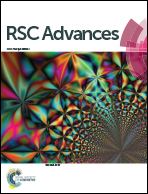Sustained delivery of anti-VEGF from injectable hydrogel systems provides a prolonged decrease of endothelial cell proliferation and angiogenesis in vitro
Abstract
Therapeutic antibodies are attractive treatment options for numerous diseases based on their ability to target and bind to specific proteins or antigens. Bevacizumab, an antiangiogenic antibody, has shown promise for multiple diseases, including various cancers and macular degeneration, where excessive VEGF secretion induces aberrant angiogenesis. In many cases local, sustained delivery of a therapeutic antibody would be preferable to maximize the therapeutic at the disease site, eliminate the need for repeated doses, and reduce systemic side effects. The biodegradable polysaccharides alginate and chitosan can electrostatically interact to form a polyelectrolyte complex (PEC), and have proved effective as a carrier for controlled release of antibodies. In this work, an alginate–chitosan PEC system was designed to produce targeted 30-day delivery of non-specific IgG and anti-VEGF antibodies. The release of anti-VEGF was slow relative to IgG release, suggesting that release rate is antibody specific and is based on the interactions of the PEC with charges present on the antibody surface. The anti-VEGF released from the PEC was shown to successfully inhibit VEGF-induced proliferation and angiogenesis in vitro throughout the 30-day test period.



 Please wait while we load your content...
Please wait while we load your content...